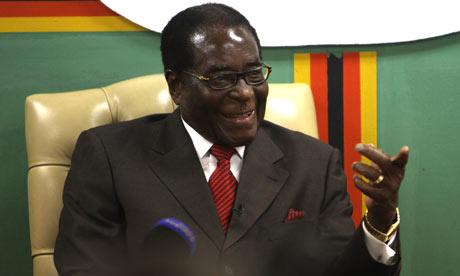Zimbabwe's economic revival is subject to an unusual degree of uncertainty associated with President Robert Mugabe's re-election, a research firm Invictus Capital (Invictus) has said.
"Following the July 31 elections, Zimbabwe is at the crossroads," said Invictus in its latest quarterly analysis of the economy.
"Over the next few months, the new administration will have to make some crucial economic policy decisions, deciding whether to stay with the International Monetary Fund (IMF) Staff Monitored Programme (SMP), agreed in April by former Finance minister Tendai Biti, or to implement policies designed to achieve some of the radical, but extravagant, promises that were made during - and since - the election campaign," read part of the report.
This comes as the southern African country's economy - which grew for the first time in a decade in 2009 - is showing signs of wearing out with this year's predicted growth having been revised downwards from five percent to 3,4 percent.
Between 2009 and 2012 the economy grew by an average of seven percent, a rate which economic experts say was high since 1960.
However, after his re-election Mugabe renewed his threats to seize British and companies operating in Zimbabwe to retaliate against sanctions imposed on his Zanu PF party.
"They should not continue to harass us, the British and Americans.
"We have not done anything to their companies here," he said in August.
"We have not imposed any controls or any sanctions against them.
"But time will come when we will say, well, tit-for-tat; you hit me, I hit you," said Mugabe.
But economist John Robertson said such utterances would harm chances of the country's revival.
"Some companies from the United States and United Kingdom are making a meaningful contribution to our economy in terms of paying taxes and providing employment," he said.
"Threatening to sanction US and British firms sends the wrong message to potential investors who might be otherwise willing to channel foreign direct investment into Zimbabwe.
After hearing such statements, some countries might not want to be near Zimbabwe because it sends a message that some decisions are made out of impulse rather than principle."
Invictus noted that since the election there have been mixed policy messages from the new administration though the persistent rhetoric of the primacy of local ownership (indigenisation) remains at the forefront of the debate.
"Some in business hope that the appointment of Francis Nhema to the ministry of Youth Indigenisation and Economic Empowerment, will provide a more moderate and pragmatic stance on indigenisation but as long as uncertainty prevails over precisely how the strategy will be implemented and over what time frame, investors will sit on their hands in wait-and-see mode," said the research and advisory firm.
Market experts contend that other elections, banks slowed down on lending after adopting a cautious lending approach due to the high levels of non-performing loans and an uncertain economic environment as the new cabinet is yet to define its economic road map.
Many banks are currently conservative and failing to meet the loan appetite from the public and private sector. The lending is estimated to have declined to below 55 percent.
As a result of the high perceived risk which has been magnified by political uncertainty, capital inflows into the country are mismatched with the demand for long term credit in the economy.
Zimbabwe currently faces a multiplicity of constraints that include low capital inflows, liquidity challenges, and high cost of utilities, obsolete equipment, expensive funding, raw material shortage, energy crisis and poor infrastructure.
"During this pause-to-reflect period, the markets in Zimbabwe are likely to be volatile on thin volumes," said Invictus.
In its September Economic Briefing, the World Bank said growth in Zimbabwe was rapidly fading due to a host of internal and external factors, with little prospects for a recovery in 2014.
"The economy faces uncertainty both from expected volatility in the global economy, and on the domestic front after July elections, amidst worsening macroeconomic indicators and increased vulnerability of the banking sector," the World Bank said.
As Zimbabwe's external position has been supported by substantial short-term capital inflows, the situation would be compounded by the risk of capital outflows from emerging markets, as the United States Federal Reserve progressively unwinds its expansionary monetary policy.
"Growth performance has been stymied by continued slowdown of the key sectors of the economy, amidst easing of international commodity prices, low investment, tight credit conditions, and policy uncertainty after the July elections," said the Bretton Woods institution.
- dailynews
 OK Zimbabwe posts US$17,8 million loss
OK Zimbabwe posts US$17,8 million loss  Hichilema meets Chivayo
Hichilema meets Chivayo  Millions celebrate Diwali festival in India
Millions celebrate Diwali festival in India  Econet Zimbabwe to delist from ZSE
Econet Zimbabwe to delist from ZSE  Gold edges up as traders await guidance
Gold edges up as traders await guidance  Mnangagwa fires Chitando, appoints Polite Kambamura
Mnangagwa fires Chitando, appoints Polite Kambamura  Young Investment Professional (YIP) Graduate Programme 2019
Young Investment Professional (YIP) Graduate Programme 2019 











 Young Investment Professional (YIP) Graduate Programme 2019
Young Investment Professional (YIP) Graduate Programme 2019
Editor's Pick